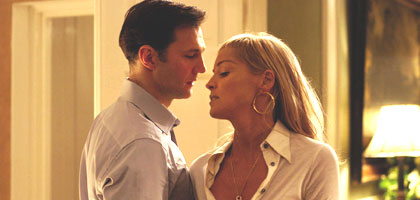
Cupid and psycho
Film of the Month: Basic Instinct 2

Fun, clever and hilarious, Basic Instinct 2 is a ludicrously entertaining addition to the 'shrinks and shagging' genre. By Linda Ruth Williams
Following 14 years after the release of the first Basic Instinct movie, this sequel has an unbelievably protracted stop-start backstory. Long referred to as Risk Addiction, and at one point touted as a stand-alone project featuring Sharon Stone but with no relationship to Paul Verhoeven's original, it is now released as the latest instalment in a neo-softcore franchise. Yet it comes with some surprisingly blue-chip components, many of them British and the result of a location change from New York to London. With Michael Caton-Jones directing and actors such as David Morrissey, David Thewlis and Charlotte Rampling in key roles, this has aspirations beyond the tawdry image of its erotic-thriller genre. Not least in the talent line-up are writers Leora Barish and Henry Bean. What are the scribes of Desperately Seeking Susan and Internal Affairs doing slumming it with a schlocky sequel like this?
One answer is they're having fun. The switchback story of Basic Instinct 2 manages to reveal the entertaining stupidity of its genre stablemates while delivering a cleverly knowing commentary upon itself. Rinsed free of the puerile shock language beloved of writer Joe Eszterhas (who penned the original Basic Instinct, as well as Jagged Edge, Jade and Showgirls), this screenplay is almost a postmodern parody of an A-list erotic thriller, an occasionally hilarious combination of daft convolution and quick-witted quipping. Replacing Michael Douglas' detective with David Morrissey's psychoanalyst, Michael Glass gives Barish and Bean huge scope for Lacanian one-liners, criminal transference and enough phallic symbols to keep academic film analysts going for years to come. And all set in the town in which Freud lived and died. This, as Caton-Jones tells us in the press notes, is not the London of double-deckers and beefeaters, but a noirish city of plate-glass architecture and Soho sleaze (in which the protagonist-shrink has ritzy consulting rooms in the phallic-shaped Gherkin). The result is an alluring travelogue laying out an anti-heritage view of London, its classy aspirations shot through with cheaper pleasures (rather like the erotic-thriller genre itself).
But though Morrissey's shrink is the taunted, tortured protagonist, centre-stage once again is Stone's Catherine Tramell, writer of sex-crime popular fictions and arch femme fatale, whom some have lauded as the most powerful, get-away-with-it feminist icon of contemporary cinema. While there are problems with seeing a character penned by Eszterhas (and one best known for flashing her genitals) as a liberator of women, there is no doubt that Tramell is a cinematic survivor. The lifeblood of this sequel has always depended on Stone's presence in the role, and she goes at it for all she's worth. Stone's image as cool stylista rests on her celebrated relationship with clothes, and costume (particularly an outrageous shoe collection) tells one of Tramell's stories in Basic Instinct 2. But the film also plays peek-a-boo with nudity, showing and not-showing: it wants to display as much of Stone's honed fortysomething body as it can get away with, while avoiding a repeat of the first film's crotch-flash. This is only one of the games the sequel plays with the original: Tramell repeatedly lights up and then is told not to smoke (remember "what are you gonna do? Charge me with smoking?"); the first film's ice-pick is replaced with erotic/murderous srangulation; there's also a pay-off moment when Tramell declares (as Barish, Bean or Eszterhas might), "I'm a writer… [of] the lurid, the violent, the sexual - the basic instincts." But perhaps most interesting is the moment when, anticipating the shot of Stone that appears on the film's carpet-bombed poster, Tramell straddles a chair backwards as she talks dirty to Glass. The image tells us that Stone will open her legs, but audiences won't be privy to the view. It evokes the famous shot of Christine Keeler straddling an Arne Jacobsen chair, an iconic British sexual image, recalling that Caton-Jones has traversed this territory before when directing Scandal (1988), the film of the Profumo affair in which Keeler figured. But, as any aficionado of the erotic thriller knows, it also evokes the publicity image of Gregory Hippolyte's key straight-to-video erotic thriller Mirror Images, which delivered a similarly daft psychobabble-inflected mélange of sex-crime the year before Verhoeven's first film.
If nothing else, then, Basic Instinct 2 knows its genre place, and it knows that mind-fucking, as well as body-fucking, has long been a staple of 'suspense in suspenders' movies. Another term for the erotic thriller is the 'cops and copulation' film; for this film, the formula 'shrinks and shagging' would be more apt. Basic Instinct 2 takes its place alongside other 'shrinks and shagging' films in which susceptible analysts take therapy too far with dodgy patients Color of Night, Final Analysis), inventing curious movie diseases in the process. Final Analysis discovered "pathological intoxication", Jade unearthed "hysterical blindness", while Tramell's murderous malaise in Basic Instinct 2 is "risk addiction", which Glass calls a vacillation "between a feeling of God-like omnipotence and a feeling that [the patient] doesn't exist." He goes on: "The greater the risk, the greater the feeling of omnipotence." It's all there in Tramell's personalised number plate, seen in the film's opening sequence: "DIII CAT".
Is it Catherine who will die, or Catherine who will kill? Is she really innocent? (One of her alibis - that she was walking around the central London district Clerkenwell - casts her more as a maligned flaneuse or lady of the night than a murderous psycho.) Is the whole plot an expression of her risk addiction?
Some of this we will never know: Basic Instinct 2 plays a perverse game with its whodunit-hunting viewer, in that it suggests that a number of characters are culpable, and that perhaps Tramell's demonism is all about provoking others to follow their own devils wherever they may lead. It suggests the sado-masochistic truth of many (perhaps all) relationships, that no one can be made to do what they don't want to do in the first place. One of the most compelling readings of the original film, by Robert E. Wood, saw the novelist as responsible for everything that Douglas' Nick does, feels and thinks, not just as a come-hither femme fatale, but as a story-teller who 'narrates' him into being and then writes about it in her book, Shooter. Perhaps it's all just a domination fantasy generated by the police officer; perhaps Tramell really can 'make people up'. I have previously speculated about this as a kind of linguistic vampirism, with Tramell's words bleeding Nick's real existence dry (Shooter grows, Nick weakens). Tramell's choice of an analyst as her hero/ victim takes her fiction into new directions, for psychoanalysis is more about sex and death than the policier ever was.
But more than anything else, the film's turn-everything-on-its-head coda makes explicit the fact that Basic Instinct 2 knows it's a story, even as it reinforces to baffled audiences the possibility that the story they think they've seen may not be everyone's reading. Glass is incarcerated in an institution
for the criminally insane after murdering the police officer (Thewlis' character) Tramell identified as the real killer. There he is visited by the novelist, who paraphrases to him her latest book, The Analyst. Its twist, and perhaps the twist of Basic Instinct 2, is that the analyst did it after all, using the women as smokescreen. Basic Instinct 2 then lifts from the codas of both The Usual Suspects and Wild Things a manipulation of the flashback seen from a different point of view once a key 'truth' has been revealed - a retrospective reinterpretation of the film's memory of itself just before the credits roll. "Of course, it could also be a fiction," says Tramell, inviting the viewer to read the whole absurd tale as the 'shrinks and shagging' shaggy-dog story that it is. "Everything that comes out of her fucking mouth is a lie," Thewlis' twisted detective has previously observed (Thewlis gets all the best lines). "Even the truth's a lie." Truth or fantasy, fiction or lie, it probably doesn't matter what Basic Instinct 2 is, if you're watching it (as Caton-Jones has urged) as a "Saturday-night film". But Basic Instinct 2 is rather more than that as well. "Don't take it so hard," says Tramell at Glass' demise. "Even Oedipus didn't see his mother coming." This is psychoanalytic fable rewritten as pulp fiction. Perhaps that's why it's so ludicrously entertaining.
